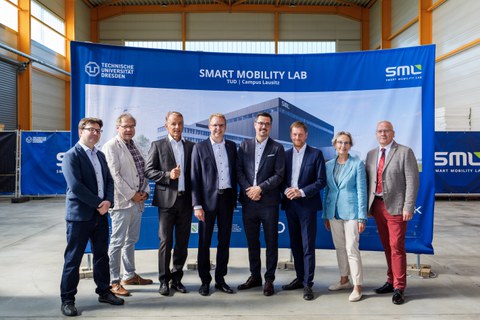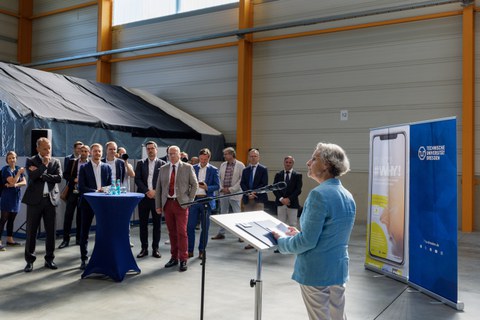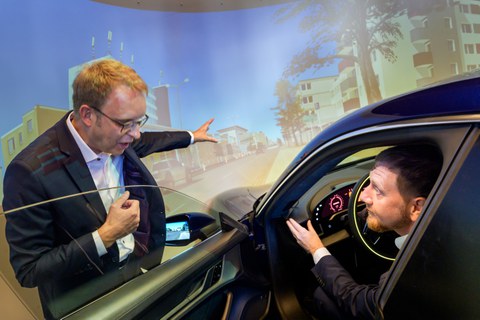Sep 09, 2024
Modern infrastructure for the mobility of the future: Launch event for TU Dresden Smart Mobility Lab with introduction of future users

From left to right in front of the unveiled visualisation of the SML: Prof. Christoph Sommer, Prof. Uwe Aßmann, Prof. Hartmut Fricke, Prof. Günther Prokop, Marcel Goßmann (Goldbeck), Michael Kretschmer, Prof. Ursula Staudinger and Torsten Ruban-Zeh.
Today, TUD Dresden University of Technology celebrated the construction of TU Dresden’s Smart Mobility Lab in an event attended by Saxony's Minister President Michael Kretschmer and the Lord Mayor of Hoyerswerda, Torsten Ruban-Zeh. The future users of the TUD research campus currently being built in Schwarzkollm, a district of Hoyerswerda in Lusatia, introduced themselves at the current test site of the Dresden Driving Simulator, which will be operated as the world's largest driving simulator in the Smart Mobility Lab. With a total investment of over EUR 100 million, it will now be home to state-of-the-art research infrastructure for networked and automated mobility.

TUD Rector Prof Ursula Staudinger (right) welcomed guests and media to the SML kick-off.
“The Smart Mobility Lab is an outstanding example of excellent interdisciplinary research at TU Dresden and of the fact that superb infrastructure is essential for outstanding research. Moreover, research infrastructure of this caliber attracts businesses who wish to carry out collaborative research. The project contributes to strengthening the Emerging Field Automated and Networked Mobility as part of our Excellence Strategy,” said the Rector of TU Dresden, Prof. Ursula Staudinger, praising the construction project.

Saxony's Minister President Michael Kretschmer took a seat in the Dresden Driving Simulator and had Prof Günther Prokop explain the details to him.
Saxony's Minister President Michael Kretschmer singled out the Smart Mobility Lab as a notable example of the innovative capacity of Saxony and emphasized the importance of the construction project for the Upper Lusatia region: “Modern mobility is one of the most crucial areas in the Innovation Strategy of the Free State of Saxony. The new Smart Mobility Lab in Hoyerswerda is a prime example of how important future technologies with global reach are being developed in Saxony. With the TU research campus, we are building new economic structures from which the people of Upper Lusatia will benefit,” said the Saxon Minister President.
State-of-the-art infrastructure for comprehensive mobility research
The Smart Mobility Lab will conduct interdisciplinary research into emission-free, smart, safe and multimodal mobility.
The one-hectare, 30-meter-high driving and flight test hall on the TUD research campus will house the latest technologies for the development, testing, certification and technical monitoring of unmanned vehicles and aircraft, as well as unique laboratories such as a climatic chamber and an electromagnetic anechoic chamber. It also includes various simulators, such as the Dresden Driving Simulator, a stationary driving simulator, a bicycle simulator and a pedestrian simulator.
The real-time networking of these simulators and the additional option of integrating real vehicles creates a new type of cyber-physical environment for researching and safeguarding complex driving scenarios.
The Chair of Automobile Engineering (Prof. Günther Prokop), Chair of Air Transport Technology and Logistics (Prof. Harmut Fricke), Chair of Agricultural Systems Technology (Prof. Thomas Herlitzius) and Chair of Software Technology (Prof. Uwe Aßmann) presented current research projects on automated mobility for road, air and agriculture. These include the projects SivaS (Safety of Networked and Automated Road Traffic), TAFAS (Test Center for Automated Flying and Autonomous Systems), FarmingSwarm-Cobots (Automated Agriculture with Autonomous Agricultural Machinery) and TERECULT (Productive Cultivated Landscapes with Recultivation Robotics).
Prof. Günther Prokop, Head of the Smart Mobility Lab and Chair of Automobile Engineering at the Friedrich List Faculty of Transport and Traffic Sciences, presents the Dresden Driving Simulator: “This is by far the largest highly immersive driving simulator in the world, creating an extremely realistic driving experience and enabling efficient, cooperative and unambiguous communication between humans and machines. The self-propelled, tire-based driving simulator theoretically allows an unlimited expansion of our operational space, which in turn results in a significant increase in simulation quality.”
TU Dresden's Chair of Mobility System Planning (Prof. Regine Gerike) and the Chair of Networked Systems Modeling (Prof. Christoph Sommer) are also involved in the interdisciplinary research project.
The Smart Mobility Lab (SML) is being built by the construction company GOLDBECK Ost GmbH; the developer for the project is TU Dresden itself with Directorate 4 – Facility Management.
An major contribution to structural change in Upper Lusatia
The construction of the Smart Mobility Lab in Hoyerswerda is an example of structural development in the former lignite mining region of Upper Lusatia. In addition to expanding urban infrastructure and creating new jobs, the aim is also to promote the establishment of start-ups and to strengthen regional economic development overall.
Torsten Ruban-Zeh, Lord Mayor of Hoyerswerda, is delighted with this new addition to his town: “The Smart Mobility Lab will create over 300 new jobs, expand the city's infrastructure and make our community even more international and diverse.”
Notes:
The Smart Mobility Lab is funded on the basis of a resolution of the German Bundestag and is partly financed by tax revenue on the basis of the budget adopted by the Saxon State Parliament.
The Dresden Driving Simulator is funded by the Federal Ministry of Digital and Transport.
Contact
Konrad Kästner
TU Dresden
Press Office
Tel.: +49 351 463 32427